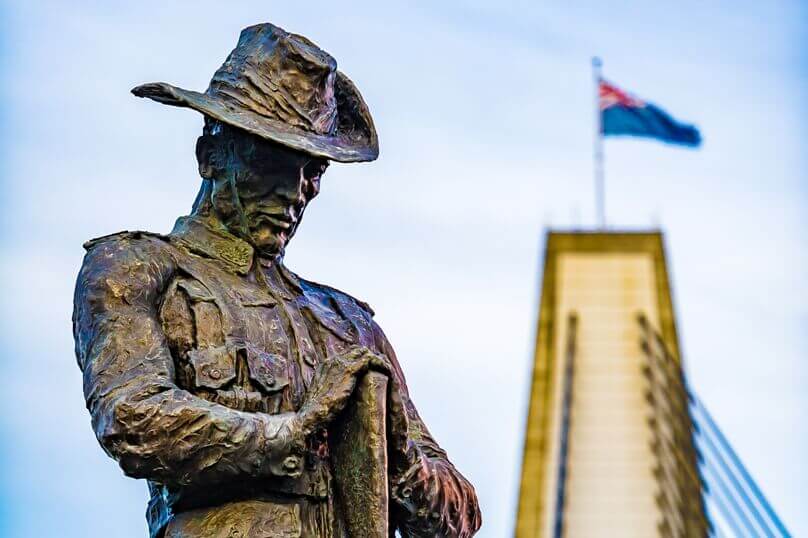
I’ve always been a fan of Peter Weir’s 1981 film Gallipoli, starring Mel Gibson as Frank and Mark Lee as Archy, with its haunting use of Albinoni’s Adagio in G. This film, like many war films, is highly romanticised: it presents war as the stage for innocence and idealism and presents this war as the place for Aussie sporting prowess, anti-authoritarianism and mateship to coalesce in our foundation myth.
Historians say it was more complex than that. But where this film and the Anzac myth it perpetuates get it 100 per cent right is in insisting on the futility of war: our two heroes compete in an ongoing race as runners, soldiers and men, but in war there are no winners.
The Anzac myth is right in another way, too: that in the midst of such pointless death, the fidelity of mateship, the hopes of youth and the love of country can rise from the ashes.
In many ways Anzac is a parable for the greatest and truest of all stories: that the One who was the Wonder-Counsellor, Mighty-God and Everlasting-Father was also the Prince-of-Peace (Isaiah 9:6); and that One brought life out of death, brought liberty out of captivity, brought peace out of violence, brought salvation out of the folly of the cross.
For now it is, in this Easter season, that the Son of man is glorified: not by avoiding death at all costs, but by being willing to die for what truly matters; only then does the wheat grain, buried as if dead in the ground, rise up to yield a rich harvest (John 12:24).
Some things are indeed worth fighting for: family, country, the innocent, the oppressed. Some wars are just. But even then, not everything goes; it is utter nonsense to say all’s fair in love and war.
The Gospels counsel us to be people of non-violence and Christians have always tried to be peacemakers, to minimise the risk of war, to reduce the conditions that lead to war, to patch up troubles and mediate peace.
As a Church we must, in the words of the Second Vatican Council, “passionately summon people to co-operate”, with the help of Christ, the Author of peace, in securing a peace based on justice and love.
But sometimes fight we must. Christ in the Gospel recognises that sometimes a man must lay down his life for his friends (cf. John 15:13).
But there must be honour, loyalty and virtue for soldiers, as the Book of Wisdom praises in the man who dies before his time (Wis 3:1-6).
Nothing in our Scriptures justifies the actions of suicide bombers and terrorists; our tradition condemns the killing of the innocent and the use of weapons of mass destruction. Governments cannot be denied the right to legitimate defence once every means of peaceful settlement has been exhausted, and so the Anzacs must sometimes be deployed; but even when that happens, the Christian goal is ultimately reconciliation, not subjugation.
As we approach the 101st anniversary of the Gallipoli landing, we join the fallen dead and grieving families from all wars, we join our countrymen and all those of any land who have lost their children to the horrors of violence, in resolving never again to glamourise war and seeking to bridge the gulfs of mutual incomprehension.
Like the deaths of martyrs, the deaths of soldiers that count for virtue are deaths in terrible circumstances, but deaths nevertheless for a good cause.
Yet no-one dies well for God or country unless he has to some extent lived well for them: how we live now prepares us for our deaths; we practise our dying in our living.
Courage, innocence, fidelity, mateship: these do not arise out of the blue on the deathbed or the battlefield, though sometimes people demonstrate qualities we or they might never have guessed were in them.
The “souls of the virtuous” are souls practised in virtue, drilled as it were like soldiers.
Though their virtue may not always have been paraded for all to see, those closest to them knew it was in them and, when challenged by enemies of one kind or another, it became obvious for all to see. The Cenotaph at Martin Place, which was witness also to the tragedy at the Lindt cafe, exhorts us to proclaim hope for humanity, amid the realities of humanity’s sinful division, and to proclaim God’s saving alternative.
The Anzacs have been celebrated for all sorts of reasons down the years, not all of them the best reasons, but they do speak to us of a thirst for peace, of fidelity to God and country, of love for family and mates.
In celebrating them this week we celebrate some of what is best in our history and in ourselves; we commit ourselves to making the world a place where young men need die no more in senseless bloodshed; and seek to make our own lives worthy of the virtue and sacrifice of our heroes and martyrs.
